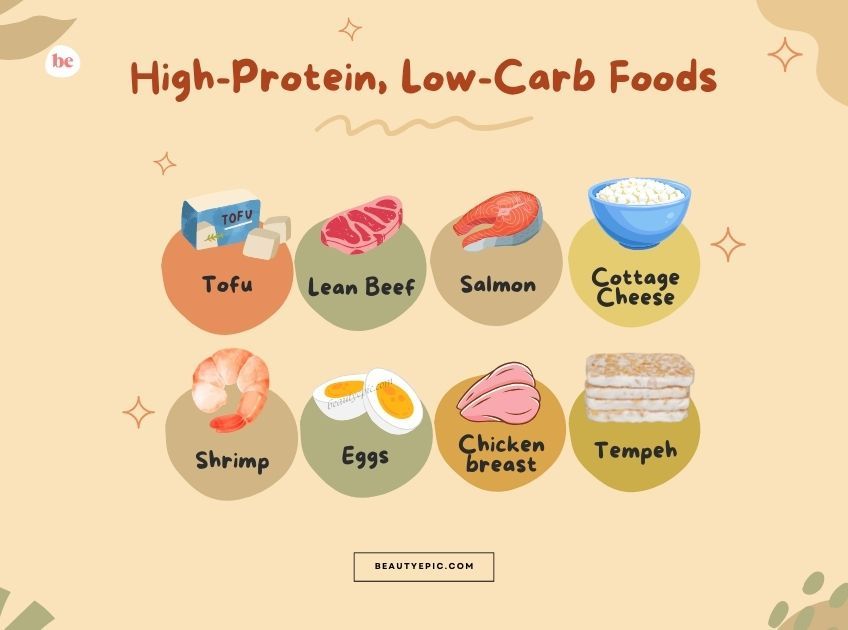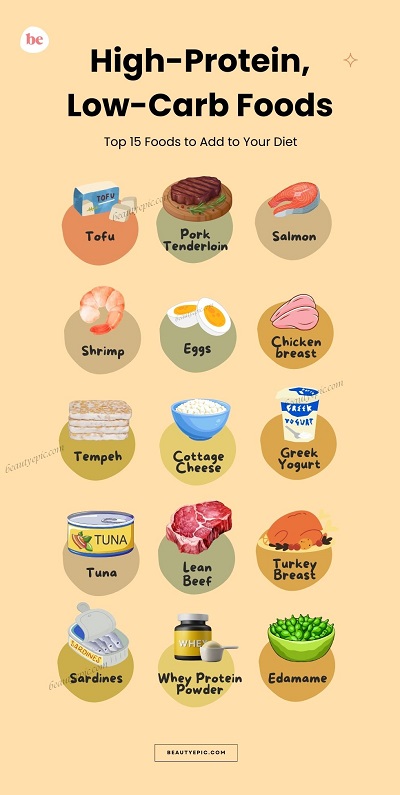
Important: This article is for informational purposes only. Please read our full disclaimer for more details.
Are you looking to shed extra weight, tone up, or simply fuel your body better? Adding high-protein, low-carb foods to your diet can help you burn fat, build lean muscle, and stabilize blood sugar levels — all while keeping you satisfied for longer.
Research published in the American Journal of Clinical Nutrition suggests that low-carb, protein-rich diets can significantly boost metabolism, control appetite, and support fat loss (1)(2). Whether you’re following a keto lifestyle, aiming for weight loss, or just making smarter food choices, this list of 15 high-protein, low-carb foods is your ultimate guide.
Why High-Protein, Low-Carb Foods Are a Game-Changer
Protein is essential for muscle repair, hormone production, and energy balance, while reducing carbs helps regulate insulin levels and promote fat burning. Together, this combo offers:
- Faster fat loss – Low-carb diets encourage the body to burn stored fat for energy
- Improved satiety – Protein keeps you feeling full longer and reduces cravings
- Stable energy levels – No more sugar crashes or midday slumps
- Better muscle retention – Protein preserves lean mass even when in a calorie deficit
15 High-Protein, Low-Carb Foods
1. Chicken Breast 🐔
- Protein: 31g per 100g
- Carbs: 0g
- Calories: ~165 kcal
Chicken breast is a lean protein superstar. It’s perfect for anyone trying to lose fat while preserving lean muscle mass. It’s also a versatile ingredient — bake, grill, roast, or stir-fry it with your favorite spices.
Pro tip: Marinate chicken in olive oil, garlic, and lemon juice for extra flavor without adding carbs.
2. Salmon 🐟
- Protein: 20g per 100g
- Carbs: 0g
- Calories: ~206 kcal
Salmon is a nutrient powerhouse — packed with protein, omega-3 fatty acids, and vitamin D. Omega-3s support brain function, reduce inflammation, and help burn stubborn fat.
Best uses: Grill, bake, or pan-sear with herbs for a heart-healthy, low-carb meal.
3. Eggs 🥚
- Protein: 6g per egg
- Carbs: <1g
- Calories: ~70 kcal
Eggs are a complete protein source containing all nine essential amino acids. They also provide healthy fats and vital nutrients like choline, which support brain health.
Pro tip: Opt for boiled eggs for a quick snack or scramble them with spinach for a filling, low-carb breakfast.
4. Greek Yogurt (Unsweetened) 🥄
- Protein: 10g per 100g
- Carbs: ~4g
- Calories: ~59 kcal
Greek yogurt is rich in probiotics, which improve digestion and gut health. It’s creamier and higher in protein than regular yogurt, making it ideal for low-carb diets.
Best uses: Top with nuts, chia seeds, or berries for a high-protein, low-carb dessert.
5. Tofu 🌱 (Plant-Based Option)
- Protein: 8g per 100g
- Carbs: 2g
- Calories: ~76 kcal
Tofu is made from soybeans and is a fantastic vegetarian protein source. It absorbs flavors beautifully and provides isoflavones, plant compounds that may support heart health and hormonal balance.
Best uses: Pan-fry tofu cubes with sesame oil or add them to soups, curries, and salads.
6. Cottage Cheese (Low-Fat) 🧀
- Protein: 11g per 100g
- Carbs: ~3g
- Calories: ~98 kcal
Cottage cheese contains casein protein, which digests slowly, making it great for muscle repair overnight. It’s also rich in calcium, promoting bone health.
Best uses: Eat it plain, mix with cucumber and herbs, or blend into a creamy, low-carb smoothie.
7. Tuna (Canned in Water) 🐠
- Protein: 23g per 100g
- Carbs: 0g
- Calories: ~132 kcal
Tuna is a low-calorie, high-protein staple perfect for quick meals. It’s also rich in selenium, which supports thyroid function and overall metabolism.
Best uses: Mix tuna with avocado instead of mayo for a keto-friendly tuna salad.
8. Turkey Breast 🦃
- Protein: 29g per 100g
- Carbs: 0g
- Calories: ~135 kcal
Turkey breast is another lean protein source that helps control hunger and maintain muscle mass. It’s also lower in fat compared to other meats, making it perfect for weight-loss-friendly diets.
Best uses: Grill turkey slices for sandwich wraps or low-carb salads.
9. Shrimp 🍤
- Protein: 24g per 100g
- Carbs: 0g
- Calories: ~99 kcal
Shrimp is low in calories, carb-free, and high in protein. It’s also packed with iodine and selenium, nutrients that support a healthy thyroid and metabolic rate.
Best uses: Sauté shrimp with garlic butter or toss them into a zucchini noodle stir-fry.
10. Tempeh 🌱 (Plant-Based Option)
- Protein: 19g per 100g
- Carbs: 9g
- Calories: ~195 kcal
Tempeh is a fermented soy product that’s richer in protein and fiber than tofu. It contains probiotics that improve gut health and digestion.
Best uses: Marinate tempeh in soy sauce and spices, then pan-fry or bake for a crispy, low-carb snack.
11. Lean Beef 🥩
- Protein: 26g per 100g
- Carbs: 0g
- Calories: ~250 kcal
Lean cuts of beef like sirloin, tenderloin, or flank steak are excellent sources of protein and iron, which support red blood cell production and energy levels.
Best uses: Grill or stir-fry beef with broccoli and bell peppers for a nutritious, low-carb dinner.
12. Sardines 🐟
- Protein: 25g per 100g
- Carbs: 0g
- Calories: ~208 kcal
Sardines are nutrient-dense and packed with protein, calcium, omega-3s, and vitamin D — essential for bone strength and heart health.
Best uses: Eat them straight from the can, add to salads, or mash into avocado toast.
13. Whey Protein Powder 🥤
- Protein: ~25g per scoop (30g)
- Carbs: 2g
- Calories: ~120 kcal
Whey protein is a fast-digesting protein ideal for post-workout recovery. It helps boost muscle synthesis and promotes fat burning when used as a meal replacement.
Best uses: Blend with unsweetened almond milk and spinach for a low-carb smoothie.
14. Edamame 🌿 (Plant-Based Option)
- Protein: 11g per 100g
- Carbs: 4g
- Calories: ~120 kcal
Edamame, or young soybeans, are rich in plant protein and fiber while keeping carbs low. They also contain isoflavones, which may support hormonal balance.
Best uses: Steam and sprinkle with sea salt, or toss into low-carb salads.
15. Pork Tenderloin 🥓
- Protein: 26g per 100g
- Carbs: 0g
- Calories: ~143 kcal
Pork tenderloin is a lean, high-quality protein source that’s juicy, flavorful, and easy to cook. It’s also rich in B vitamins for energy production.
Best uses: Roast pork tenderloin with rosemary and garlic for a low-carb, protein-packed dinner.
Frequently Asked Questions (FAQ’S)
Q1. How much protein should I eat daily on a low-carb diet?
A. For most adults, aim for 1.2 to 2.2 grams of protein per kilogram of body weight, depending on activity levels and goals.
Q2. Can high-protein, low-carb diets cause side effects?
A. Some people may experience fatigue or digestive changes initially, but these often resolve as your body adjusts to using fat as fuel. Staying hydrated and including fiber-rich vegetables can help.
Q3. Are plant-based, high-protein, low-carb foods enough for muscle gain?
A. Absolutely! Combining tofu, tempeh, edamame, and nuts can provide a complete amino acid profile to support muscle building and repair.
Incorporating high-protein, low-carb foods into your diet can transform your energy levels, body composition, and overall health. Whether you’re looking to lose fat, build muscle, or simply eat cleaner, this food list gives you endless meal possibilities without the carb overload.
















